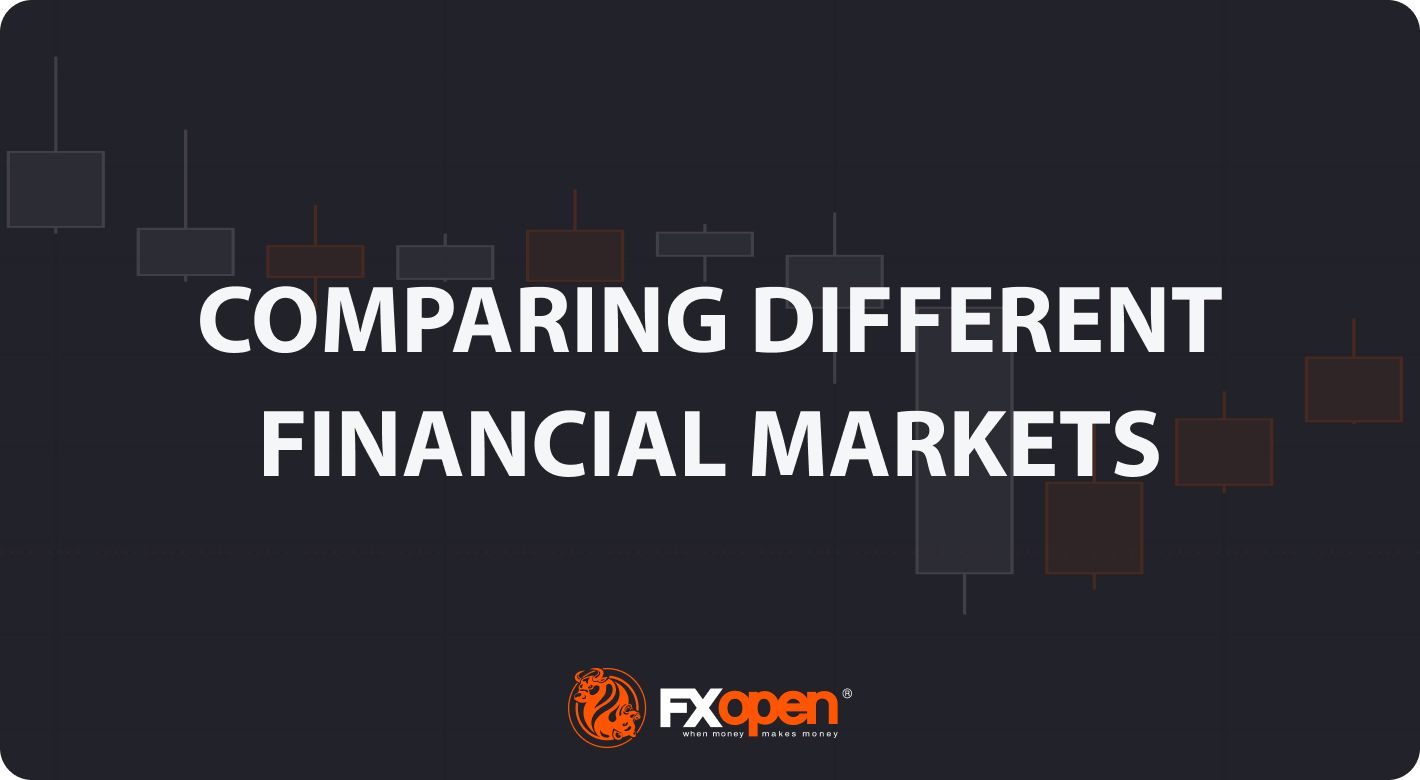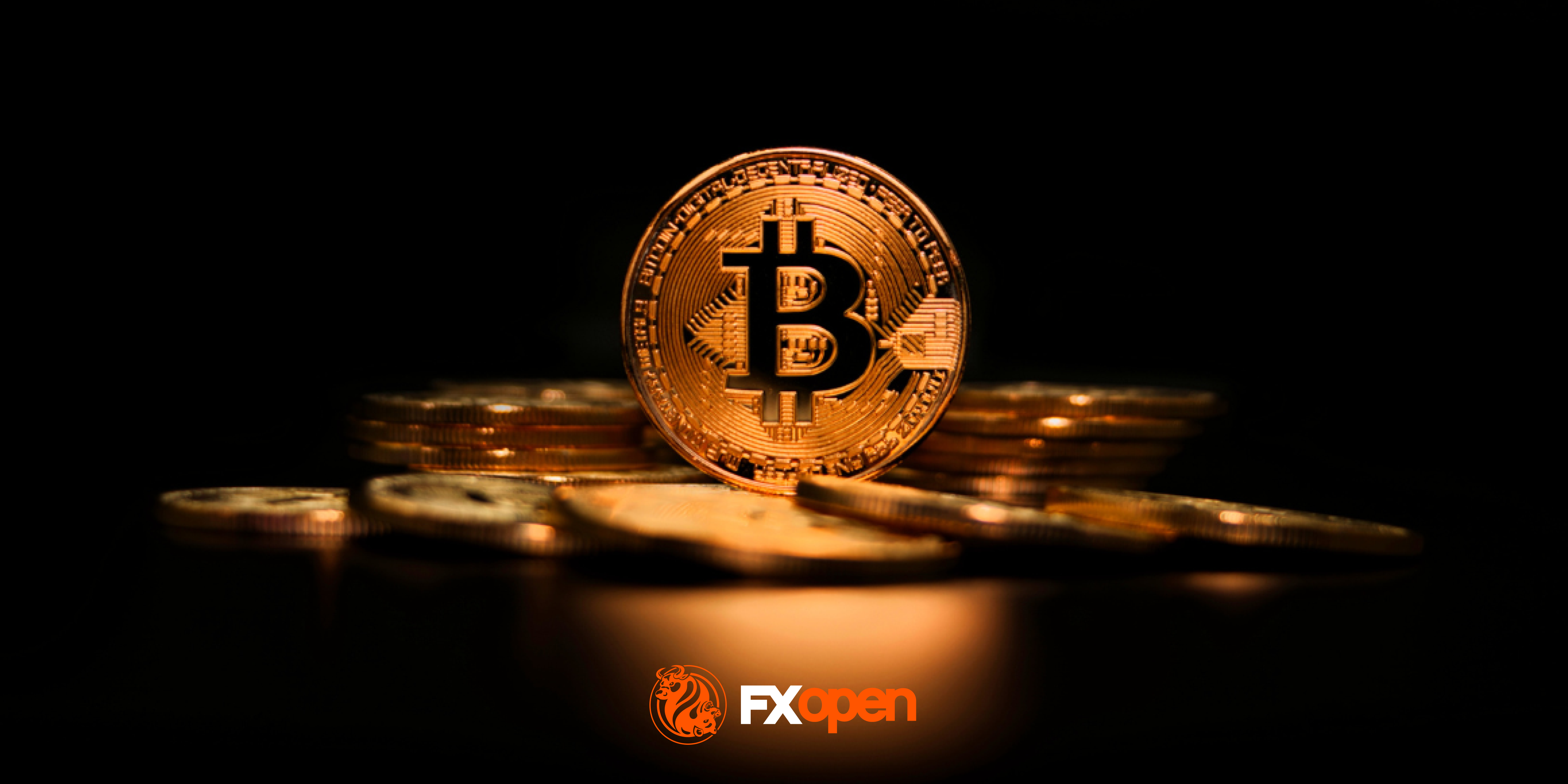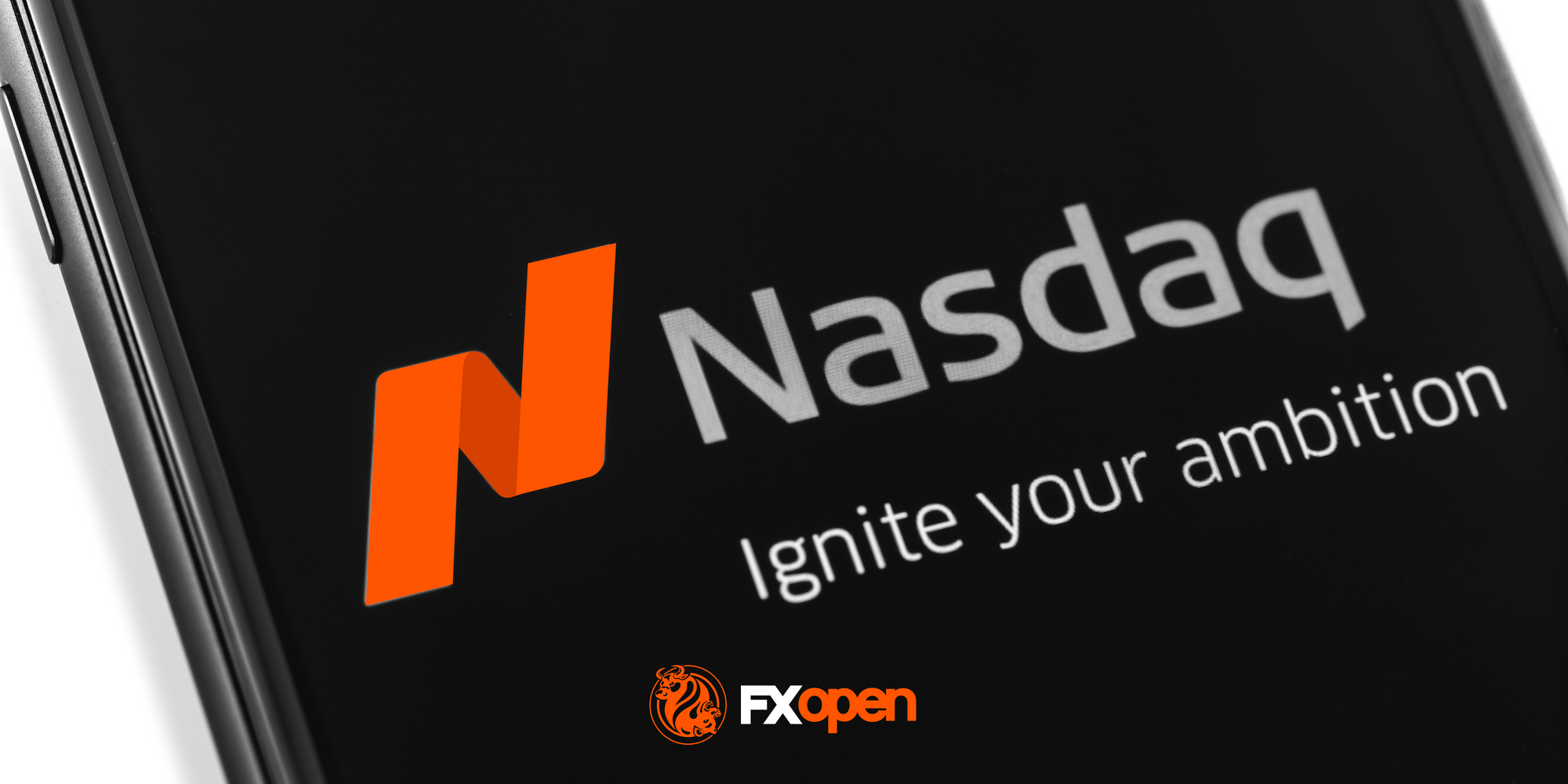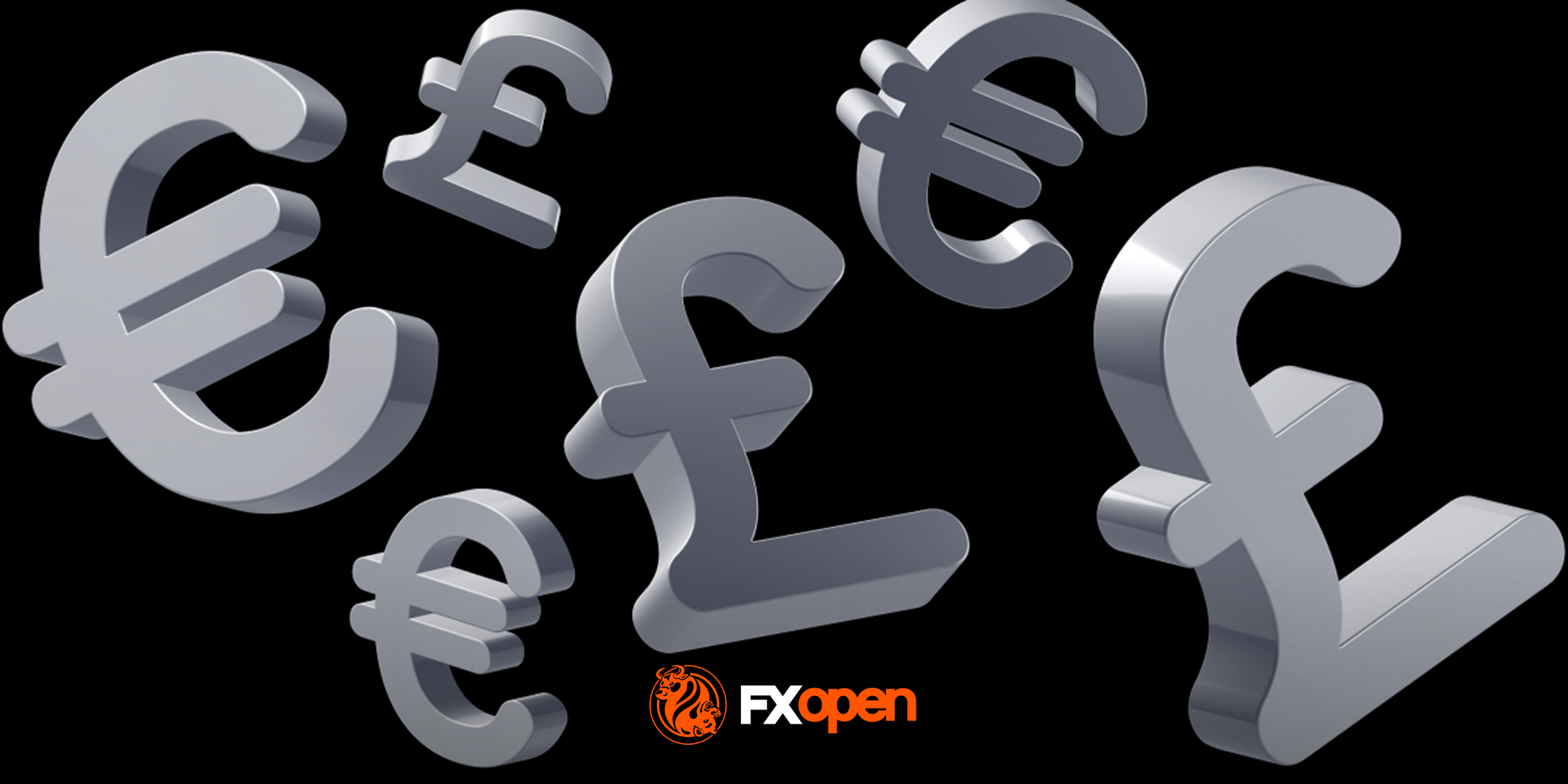FXOpen

In trading, understanding the types of international financial markets is crucial. This article offers a comprehensive market comparison of the stock, forex, commodity, crypto* and bond arenas. You’ll learn the importance of these financial markets and what it takes to navigate each one effectively.
Stock Market
The stock market is a financial marketplace where traders and investors can buy and sell shares of publicly traded companies. By purchasing a stock, an investor essentially owns a slice of the company, and their investment's value moves in tandem with the company's performance.
- Risk: Stocks can be volatile, subject to market sentiment, economic indicators, and company performance. Risk varies widely among different types of stocks.
- Income Potential: Day traders aim for short-term gains, while long-term investors often seek stocks that offer dividends or high growth potential.
- Knowledge: A solid understanding of market trends, company fundamentals, and technical indicators is beneficial for effective trading.
- Liquidity: Most stocks, especially those listed on major exchanges, have high liquidity, allowing for quick entry and exit.
- Costs and Fees: Costs can include brokerage commissions, although many online platforms now offer zero-commission trading.
- Trading Hours: Generally restricted to weekdays, opening and closing at set times, with after-hours trading being possible but less liquid.
Forex Market
The forex market is the global marketplace for buying and selling currencies. Traders pair two currencies, like EUR/USD, and profit from the fluctuations in exchange rates.
- Risk: Forex trading can be highly volatile and is considered riskier than stock trading, influenced by geopolitical events, interest rates, and economic data.
- Income Potential: High leverage can amplify gains but also increase risk. Many traders seek to profit from short-term fluctuations.
- Knowledge: Understanding of macroeconomic indicators, geopolitical events, and technical analysis can be crucial for success.
- Liquidity: Extremely high, given the 24/5 operation of the Forex market.
- Costs and Fees: Typically lower than other markets, often involving spreads rather than direct commissions.
- Trading Hours: Operates 24 hours a day, five days a week, allowing for flexibility in trading times.
Commodity Market
The commodity market is one of the types of international financial markets where physical or virtual assets like gold, oil, or agricultural products are traded. These markets often act as a gauge for supply and demand conditions globally.
- Risk: Commodities can be quite volatile, influenced by global events, natural disasters, and political instability. Traders often hedge against other market risks by investing in commodities.
- Income Potential: Gains can be substantial but are also subject to dramatic shifts based on the factors mentioned above.
- Knowledge: Understanding of global economic indicators, supply and demand factors, and geopolitical events is critical.
- Liquidity: Varies widely depending on the commodity; for example, gold and oil are highly liquid.
- Costs and Fees: This can include brokerage commissions, futures contract fees, and costs associated with physical storage for some commodities.
- Trading Hours: Vary by commodity and exchange, but many have extended hours due to global demand.
Cryptocurrency Market*
The cryptocurrency market is a decentralised digital asset market that includes cryptocurrencies like Bitcoin, Ethereum, and various tokens. It's the newest and one of the most rapidly evolving financial markets.
- Risk: Extremely volatile, with prices subject to rapid fluctuations, sometimes within minutes. Regulatory concerns add another layer of risk.
- Income Potential: High potential for both short-term and long-term gains, but also significant risk of loss.
- Knowledge: Understanding of blockchain technology, market sentiment, and technical analysis is often crucial. Familiarity with regulation is also beneficial.
- Liquidity: Generally high for well-known cryptocurrencies but can be low for lesser-known tokens and coins.
- Costs and Fees: Vary by platform and may include transaction fees, deposit/withdrawal fees, and "gas" fees for certain types of transactions.
- Trading Hours: Operates 24/7, allowing for ongoing trading and the chance to react to market news or events.
You can head over to FXOpen's free TickTrader platform to explore the above-mentioned markets for CFD trading in real-time.
Bond Market
The bond market is a segment of the financial market where debt securities are issued and traded. Unlike the stock market, which is a part of the capital market, the bond market focuses on long-term debt instruments. This highlights the difference between capital markets and financial markets.
- Risk: Generally considered lower risk compared to stocks and commodities, although risk can vary depending on the issuer's creditworthiness.
- Income Potential: Lower yield compared to more volatile markets, but often offers more stable returns through interest payments.
- Knowledge: Understanding of interest rates, yield curves, and credit ratings is essential for bond trading.
- Liquidity: Varies depending on the type of bond; government bonds are usually highly liquid, while corporate bonds can be less so.
- Costs and Fees: Transaction costs are generally built into the bond's price, but some brokers may charge commissions.
- Trading Hours: Primarily traded over-the-counter (OTC), with some bonds available on exchanges. Trading hours can vary but are generally regular business hours.
The Bottom Line
In summary, the diverse features of financial markets offer traders a range of opportunities, from stocks and commodities to cryptocurrencies* and bonds. Armed with this knowledge, you're now equipped to navigate the markets with confidence. Want to put these insights into action? Consider opening an FXOpen account to kickstart your trading adventure.
*At FXOpen UK and FXOpen AU, Cryptocurrency CFDs are only available for trading by those clients categorised as Professional clients under FCA Rules and Professional clients under ASIC Rules, respectively. They are not available for trading by Retail clients.
This article represents the opinion of the Companies operating under the FXOpen brand only. It is not to be construed as an offer, solicitation, or recommendation with respect to products and services provided by the Companies operating under the FXOpen brand, nor is it to be considered financial advice.
Stay ahead of the market!
Subscribe now to our mailing list and receive the latest market news and insights delivered directly to your inbox.








